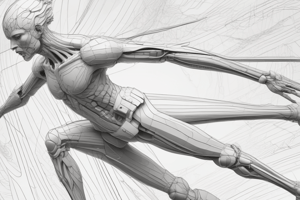Podcast
Questions and Answers
What is the main focus of biomechanics in sports?
What is the main focus of biomechanics in sports?
- Analyzing human movement (correct)
- Conducting nutrition assessments
- Studying the mental aspects of sports
- Exploring the history of different sports
How can yoga and meditation benefit athletes?
How can yoga and meditation benefit athletes?
- Improve mental well-being and reduce stress (correct)
- Increase calorie intake
- Develop muscle mass
- Enhance speed and agility
What is an important aspect of nutrition for athletes?
What is an important aspect of nutrition for athletes?
- Avoiding physical activity
- Consuming only high-sugar foods
- Skipping meals to reduce weight
- Maintaining a balanced diet for overall health (correct)
How does sports psychology contribute to athlete performance?
How does sports psychology contribute to athlete performance?
What is the primary goal of fitness training in physical education?
What is the primary goal of fitness training in physical education?
Why is yoga and meditation beneficial for athletes and non-athletes?
Why is yoga and meditation beneficial for athletes and non-athletes?
What role does nutrition play in an athlete's performance?
What role does nutrition play in an athlete's performance?
Why is sports psychology important in physical education?
Why is sports psychology important in physical education?
Which component is included in fitness training programs?
Which component is included in fitness training programs?
What do educators aim to achieve by incorporating yoga and meditation into physical education curricula?
What do educators aim to achieve by incorporating yoga and meditation into physical education curricula?
Flashcards are hidden until you start studying
Study Notes
Physical Education: A Comprehensive Approach to Health and Performance
Physical education (PE) is more than just playing games in gym class. It's a multifaceted discipline that combines biomechanics, yoga and meditation, nutrition, sports psychology, and fitness training to help individuals develop holistically, improving their overall health and performance.
Biomechanics in Sports
Biomechanics, the study of human movement, is a cornerstone of physical education. It focuses on analyzing and optimizing how the body moves, reacts, and adapts to physical activity. Teaching biomechanics helps students develop proper movement patterns, reduce the risk of injury, and maximize performance.
Biomechanics in sports includes the study of kinematics (body motion), kinetics (body forces), and energetics (body energy use). Students learn how to break down complex movements into smaller components and optimize them for better performance. For example, understanding the mechanics of a golf swing or a running stride can significantly improve an athlete's performance.
Yoga and Meditation
Yoga and meditation are increasingly popular in PE, as they help students develop mind-body awareness, improve mental well-being, and reduce stress. Yoga, a form of exercise that combines physical postures, breathing techniques, and meditation, can also improve flexibility, balance, and strength.
Yoga and meditation are beneficial for athletes and non-athletes alike, as they promote relaxation, reduce stress, and improve focus and concentration. By incorporating yoga and meditation into PE curricula, educators can help students build resilience and cope with the demands of athletic competition and everyday life.
Nutrition for Athletes
Nutrition is a critical component of physical education, as it plays a significant role in an athlete's overall performance and well-being. Athletes need a balanced diet that provides the nutrients, macronutrients, and hydration necessary for optimal performance.
A well-rounded PE curriculum includes education on proper nutrition, such as:
- The role of carbohydrates, proteins, and fats in supporting physical activity
- The importance of hydration before, during, and after exercise
- Strategies for fueling the body before and after competition
- The impact of supplements and ergogenic aids on performance
Sports Psychology
Sports psychology is another essential component of physical education, as it helps students develop the mental skills necessary to excel in athletic competition. By teaching students how to manage their emotions, develop goal-setting strategies, and improve self-confidence, educators can help them develop a stronger internal foundation for success.
Sports psychology focuses on:
- Emotional regulation and coping strategies
- Goal setting and motivation
- Self-confidence and self-talk
- Mental imagery and visualization
- Conflict resolution and team dynamics
Fitness Training
Fitness training, which includes cardiovascular exercise, strength training, and flexibility exercises, is an integral part of physical education. By teaching students how to develop and maintain a fitness regimen, educators can help them improve their overall health and well-being.
A well-rounded fitness training program includes:
- Aerobic conditioning, such as running, swimming, or cycling
- Strength training, such as resistance exercises or bodyweight training
- Flexibility exercises, such as stretching or yoga
- Core stability exercises, such as planks or crunches
Conclusion
Physical education is more than just playing games and exercising. It's a comprehensive approach to health and performance that integrates biomechanics, yoga and meditation, nutrition, sports psychology, and fitness training. By understanding and applying these principles, individuals can optimize their physical abilities, improve their mental well-being, and develop resilience in the face of athletic competition and everyday life.
As a PE teacher, it's essential to create a learning environment that promotes curiosity, exploration, and adaptability, allowing students to develop the knowledge, skills, and confidence necessary to achieve their full potential. By embracing the elements of a comprehensive physical education curriculum, you can help students build a stronger foundation for success, both on the playing field and in life.
Studying That Suits You
Use AI to generate personalized quizzes and flashcards to suit your learning preferences.




